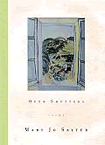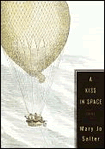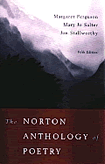Mary Jo Salter
posted Aug 20, 2005
Mary Jo Salter turns the idea of labels on its head, excelling in multiple disciplines: she's an acclaimed poet, respected professor, and co-editor of The Norton Anthology of Poetry.
failbetter.com's poetry editor, Meghan Cleary, came up with a few questions for Salter, and we put them to her via email, on her return from a teaching engagement at the Sewanee Writers Conference.
| * * |
How does the title Open Shutters relate to and work with the poems in the collection?
I was myself pretty slow to realize, in putting this book together, how often the image of shutters was appearing. The illusory shutters in "Trompe l'Oeil" ["...you see them: windows with open shutters. Then the illusion shatters. But that's not true. You knew the shutters were merely painted on"—eds.] are followed by "Advent," in which there are real shutters that blow off a real house, a door that breaks in a gingerbread house, and mini-shutters opening day by day in an advent calendar. Clearly, in some way I could never articulate rationally, for a while I was going through a period of obsession with frames for vision, and with the ways that vision is enlarged by limitations and illusions. Many poems in my previous books had to do with paintings; this time, I was more drawn to photography—in poems like "In the Guesthouse," where an amateur "shutterbug" records artlessly the biography of a family, or in "School Pictures." Our eyes, not just our cameras, employ shutters, of course, and by the end of the collection, in the poem "An Open Book," I was playing too with the shutters of book covers, and the mystery of reading other people, other cultures.
Several poems in Open Shutters revolve around real-life disasters—"TWA 800," for example, and the post 9/11 poem "After September." Do you think poets take a risk when they address specific current events in their work?
Absolutely. The 9/11 poem was actually commissioned by Anne Fadiman, then the editor of The American Scholar, who told me she wanted to publish an issue devoted to the disaster in different ways. At first, I told her I couldn't do it. And then, a month later, I thought I might. "After September" may eventually sound dated—but I tried to deal more generally with the notion of terror, and of alienation from others, which unfortunately isn't a subject that's going to go away any time soon. Explicitly current-events-based poems rarely work, I think, for two reasons: the circumstances rarely will seem immediate, or even comprehensible, for readers years hence; and for contemporary readers, a better medium for proposing political or social change is probably the newspaper editorial. In "TWA 800," I allowed myself a short poem on that subject partly because it was a meditation on how expendable, ultimately, all of us are.
You've been called a New Formalist. What does that term mean to you? What do you think about some of the labels used to group poets into schools—"Confessional," "Language," "Beat," "New York," and so forth?
The term "New Formalism" is, fortunately, old news by now, and never meant much to me in the first place. I admire the work of many poets who are labeled New Formalists, and I thank formalist-minded critics who have written nice things about my own work, but frankly, I have never had much use for movements or manifestos. Terms like "Confessional" or "Language" may be useful shorthand in teaching a literature course, but that's about all. And bad formalist poetry is just as dispiriting as bad free verse. I prefer the term "formal poetry," because there's no agenda buried in it: it's just a neutral description of poetry that is especially indebted to devices like rhyme or meter. I'm temperamentally suited to that sort of writing, but I have often profited from reading others who write differently. I do think poets always profit from the study of form, whether or not they choose to use it.
Here's a question we also asked Marie Ponsot, one we think is fun for poets to ponder: Do you think forms live naturally in language, or does one have to summon them?
I'm fascinated by the messages, you could even say instructions, that different languages seem to offer poets. Take some of the most common rhymes in English: "night/bright" (which suggests a contrast in meaning); "light/bright" (which is nearly synonymous); or grief/relief (which suggests a hoped-for sequence of feelings), etc. Those particular conjunctions of sound and meaning are inherent in the English of our time, and depending on the sort of poem you're hoping to write, you're either going to aim for or away from them. But you can't pretend they're not there. Not only that: your goals are going to be different if you're writing with French words, and within French grammar and culture. To the extent that forms live "naturally" in language, they only live within a particular language in a very specific way. Forms come out of such distinctions. I have no idea whether this is what you're asking!—but it's an angle I think from, often.
As a creative person, why did you gravitate towards writing rather than another art form? What about writing is compelling to you?
I'm a writer because I'm not a composer. That's what I'd really love to be—a composer of long, complex symphonies and operas! To produce the wordless power of music, to move people in that way, has always seemed to me the highest artistic goal. I'm stuck with being better at words. Recently, I've been collaborating with several composers—I'm writing lyrics, that is. And in the past year, I also saw my first full-length play, Falling Bodies,performed. Some of my composer-instincts are beginning to get satisfied in these ways. My mother was a painter and, when I used to sketch with her at home, or play the piano, I thought I might end up as an artist or musician. But by the time I entered college, poetry had become the center of my life. Hard to say why, except that (as many poets have said before me) writing a new poem always feels like falling in love. Reading poems, too, often feels like that.
As co-editor of the Norton Anthology of Poetry, you must have read a lot of poetry. What was it like reading your peers? Could you elaborate on the process of assembling the Anthology? How many folks read and review all those poems? And based on your experience, what contemporary poets are doing particularly interesting work?
I don't want to tell you how many excellent poets I read that I never was able to "use" (awful word) in the Anthology, which I've edited twice now, with two marvelous colleagues, Margaret Ferguson and Jon Stallworthy. The thoroughness, the integrity, the imagination of those two people can't be overstated. And we all work very hard, knowing in advance how fallible and provisional our "final" judgments are bound to be. Yes, we've read a lot of miserable poems, but the real burden is in not including poems we admire. Even in a two thousand-page book, there just isn't room for more than a smattering of representative poems by a variety of poets for each era.
As for poets doing really interesting work now, I'd highlight Richard Kenney, who is doing amazingly difficult and original things with the English language. It's been a while since his last book, but at a recent reading he gave of new and unpublished work, at the Sewanee Writers' Conference, I was dazzled. I dropped my jaw and only closed it an hour later. Gjertrud Schnackenberg is a favorite of mine, too, and Paul Muldoon. All of these poets, in their fifties, are absolutely at the top of their game—original, musical voices, who keep pushing and re-imagining themselves. Among older poets, Richard Wilbur is my hero, still doing beautiful work in his eighties. And among younger ones, the very funny, devilishly inventive Greg Williamson is somebody to watch.
How do you go about writing? Do you have any fun superstitions or rituals you follow as you create?
My only superstition, I suppose, is that I must go to the MacDowell Colony whenever I can, and, if I can, in January. MacDowell is the most magical place I know. I went the first time at the age of 25, and I'm 50 now, so I can honestly say that it has sustained me (13 residencies so far) for half my life. I'm not a writer with a lot of requirements, in terms of this sort of pen or that sort of window to look out from. And I can write in distracting circumstances, because I have to: that's life. I just try to disappear from ordinary responsibilities for two or three weeks every year. During that time I don't check email, I don't call anyone but my family. And when I call, my husband always pretends that no pressing mail or bills have arrived at home. In thanks, I pretend I believe him. Writers tend to think differently, more daringly, with a block of solitary time—it can sustain you months after you've returned to the duties of normal life.
For our last question we'd like to shift from the poetic to the personal. You've been teaching at Mount Holyoke for years, along with your husband, the writer Brad Leithauser. Do you ever collaborate? Is poetry a regular topic of discussion at your house, or do you keep your creative worlds separate?
Poetry is most definitely a regular topic of discussion in our house. I've been immersed in Marianne Moore lately, and Brad knows a lot about her. So we ask questions like: Why couldn't she appreciate Auden's "The Sea in the Mirror?" What made her such a devotee of Stevens? Have you seen this wonderfully blunt letter she wrote to Allen Ginsberg? We talk about such things almost as often as we do about who's going to the grocery store.
But we do keep our writing worlds separate, in that we never show each other our work until we think it's as good as we can make it. That means I don't read one word of Brad's novels before he thinks he's finished—which can take six years. But then we do take each other's criticism very seriously.
I've loved collaborating with people—in editing, in writing songs, in producing a play. I like seeing my ways of thinking shaken up. And Brad has relished collaborating with his artist brother, Mark, on books. But no, Brad and I never collaborate on writing. Bad idea. We figure we already share a job (each teaching half time at Mount Holyoke College), and share two daughters, and that is sufficient collaboration. Wouldn't want to overdo it!
© 2005 failbetter LLC · all rights reserved










